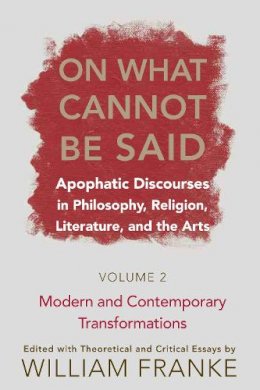9%OFF
Stock image for illustration purposes only - book cover, edition or condition may vary.
On What Cannot Be Said: Apophatic Discourses in Philosophy, Religion, Literature, and the Arts: Volume 2: Modern and Contemporary Transformations
William Franke
FREE Delivery in Ireland
Description for On What Cannot Be Said: Apophatic Discourses in Philosophy, Religion, Literature, and the Arts: Volume 2: Modern and Contemporary Transformations
Paperback. Apophasis has become a major topic in the humanities, particularly in philosophy, religion, and literature. This two-volume anthology gathers together most of the important historical works on apophaticism and illustrates the diverse trajectories of apophatic discourse in ancient, modern, and postmodern times. Num Pages: 544 pages. BIC Classification: HRAB1; HRCM. Category: (UP) Postgraduate, Research & Scholarly. Dimension: 229 x 156 x 29. Weight in Grams: 652.
Apophasis has become a major topic in the humanities, particularly in philosophy, religion, and literature. This monumental two-volume anthology gathers together most of the important historical works on apophaticism and illustrates the diverse trajectories of apophatic discourse in ancient, modern, and postmodern times. William Franke provides a major introductory essay on apophaticism at the beginning of each volume, and shorter introductions to each anthology selection. The second volume, Modern and Contemporary Transformations, contains texts by Hölderlin, Schelling, Kierkegaard, Dickinson, Rilke, Kafka, Rosenzweig, Wittgenstein, Heidegger, Weil, Schoenberg, Adorno, Beckett, Celan, Levinas, Derrida, Marion, and more.
Product Details
Publisher
University of Notre Dame Press
Place of Publication
Notre Dame IN, United States
Shipping Time
Usually ships in 7 to 11 working days
About William Franke
William Franke is professor of comparative literature and religious studies at Vanderbilt University and past professor of philosophy and religions at the University of Macao (2013–16). He is a research fellow of the Alexander von Humboldt-Stiftung and has been Fulbright-University of Salzburg Distinguished Chair in Intercultural Theology and Study of Religions. He is the author of A Philosophy of the ... Read moreUnsayable (University of Notre Dame Press, 2014). Show Less
Reviews for On What Cannot Be Said: Apophatic Discourses in Philosophy, Religion, Literature, and the Arts: Volume 2: Modern and Contemporary Transformations
“One of the most important and original contributions to the discussion of apophasis in recent years. . . . Franke’s historical and disciplinary range, in light of his well-written and compelling essays, provides an illuminating insight into the pervasiveness of apophatic discourse. . . . Franke’s anthology is a resource which should not be ignored. Few others, maybe no others, ... Read moreprovide the same clarity, coherence, and scope.” —Christianity and Literature “The genius of Franke’s two-volume critical anthology on apophatic discourses is the work’s breadth and depth of engagement with the concept in variously distinct and even conflicting contexts. . . . Franke manages his sweeping and inclusive exploration of apophatic discourses by identifying a thematic lens for selecting his sources as part of a larger, conceptually-rooted genre of discourse. . . . The greatest strength of Franke’s two-volume collection resides in the sheer fact that nothing like it exists.” —Essays in Philosophy “The second volume, stretching from Holderlin to Jean-Luc Marion, provides readings from sources as diverse as Schelling, Dickinson, Kafka, Wittgenstein, John Cage, and Maurice Blanchot. . . . Franke observes that these modern and contemporary apophatic currents, as ra dical as they truly are, are nevertheless thoroughly indebted to the 'ancient theological matrices' out of which they indirectly (or not so indirectly) spring. . . . I recommend these two volumes as essential reading for philosophers, theologians, literary scholars, intellectual historians, critical theorists—in short, anyone interested in an illuminating and vital perspective on just about any facet of Western arts and letters." —Religion and Literature Show Less

